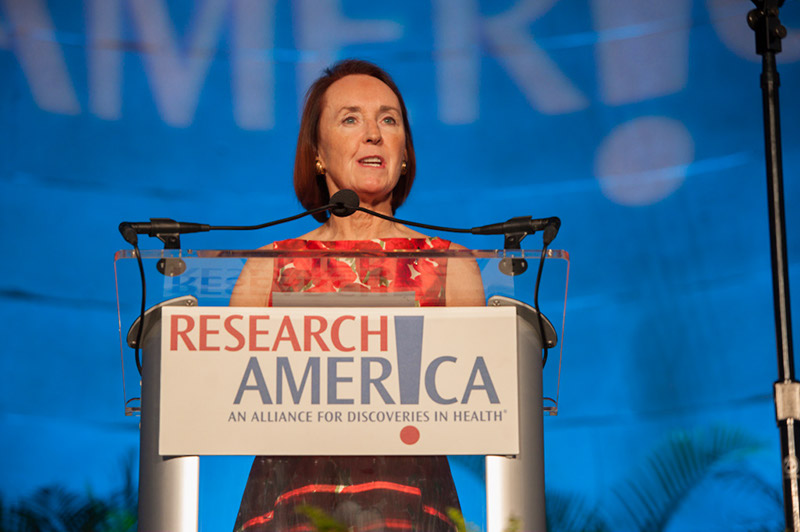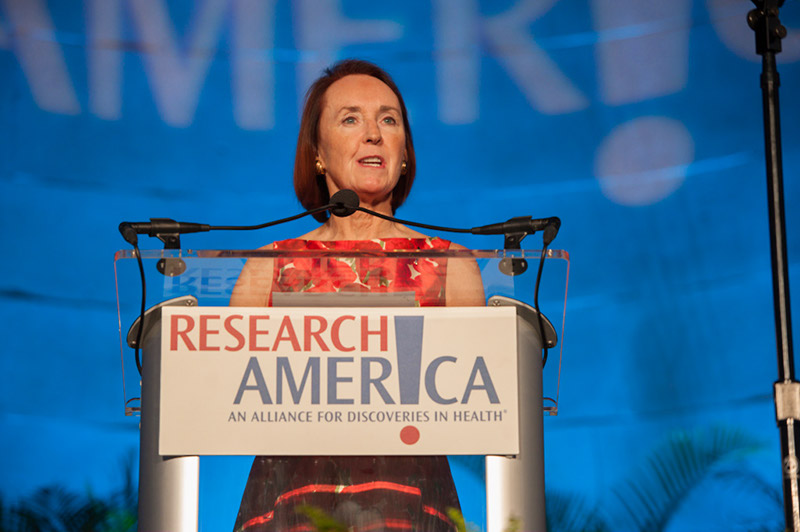Staying Unstuck

 Dear Research Advocate,
Dear Research Advocate,
Almost 30 years ago to the day, April 2, 1988, President Ronald Reagan delivered a radio address to the nation on the federal government’s role in scientific research. “We cannot know where scientific research will lead. The consequences and spin-offs are unknown and unknowable until they happen. But one thing is certain: If we don’t explore, others will, and we’ll fall behind.” The fact that the FY18 omnibus cites concerns that “China and 34 other competitors are outpacing the United States in terms of research spending,” demonstrates that President Reagan’s words ring true today. Our job now, to paraphrase former Congressman and Research!America Board Member Bart Gordon, is to ensure policymakers and the public remain confident that research is a wise investment. We are on the right path for now, but in order for this progress to continue, we must all take responsibility for highlighting the value and impact ofscience.
Bart’s remarks were part of a discussion on messaging during our alliance member call earlier this week. Along with our partners in advocacy, we are working to determine which approach best builds on the current momentum. If you have thoughts about messaging or specific “asks” for NIH, CDC, AHRQ, FDA and NSF please contact Ellie ([email protected]) soon to discuss.
During the call, we noted that the first order of business is to thank congressional champions for their work in FY18. Please join our sign-on letter to the Chairs and Ranking Members of the “Labor-H” Subcommittees thanking them for securing increases for NIH and our nation’s other profoundly important public health agencies. Add your organization here or contact Sara ([email protected]).
Speaking of saying thank you, two weeks ago at our awards event, Research!America Chair Emeritus and 2018 Legacy Award recipient The Honorable John Edward Porter dedicated his award to “the entire NIH family including those who clean the labs and scrub the floors,” noting that “All of them are essential to the NIH’s vision.” To watch videos of Congressman Porter’s remarks and those of the other honorees, click here. To read Mr. Porter’s views on the importance of the NIH check out his recent conversation with the Cancer Letter. And for more on how NIH has fared under the Trump Administration, check out this Vox article, featuring a quote from our VP of Communications Suzanne Ffolkes.
More thanks, these to Steve Grossman, deputy executive director of the Alliance for a Stronger FDA, who joined the alliance call to discuss the FY18 FDA outcome (a modest increase that sets the stage for even better results in FY19) and reviewed some of the many ways FDA Commissioner Scott Gottlieb is working to ensure the agency keeps pace with rapidly evolving science and technology.
One of Commissioner Gottlieb’s initiatives is in the area of health IT. Stubborn challenges, including systems that are not interoperable, continue to compromise its enormous potential. Former Vice President Joe Biden recently penned an op-ed recommending concrete steps to realize the health IT goals the White House identified in an announcement earlier this month. There is consensus all around that it’s time to get past “admiring the problem,” and fix it. Research!America is working as part of the Health IT Coalition and with others in the community to advance that goal, and has also assigned a top priority this year to helping “unstick” viable solutions to clinical research challenges. More to come on this…
We will also continue to make the case for assigning a higher priority to strengthening our nation’s public health capacity as Dr. Robert Redfield takes the helm at the CDC. In an email to agency staff, Dr. Redfield stated his intention to “effectively foster the programs and necessary research that will benefit the health, safety and security” of Americans.
Our nation’s public-health agencies are required to respond to a plethora of complex challenges across the health spectrum. One such challenge is migraine, a shockingly debilitating condition that affects an estimated 39 million Americans (and 1 billion individuals worldwide). Tune in on Wednesday, April 11 at 3:00 pm Eastern for our webinar about migraine research challenges (and opportunities) — more info here.
The FY18 omnibus shows that Congress can overcome partisan gridlock and get the job done, but successes like these are all too rare. Research!America Chair The Honorable Michael Castle recently spoke of the need for greater bipartisan cooperation and legislation that betters the country as a whole. We second Governor Castle’s sentiments — the health issues our nation must address are far too important; we can’t afford to backtrack.




